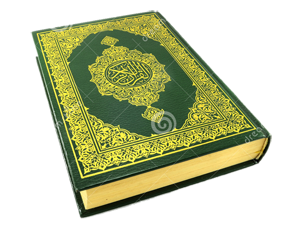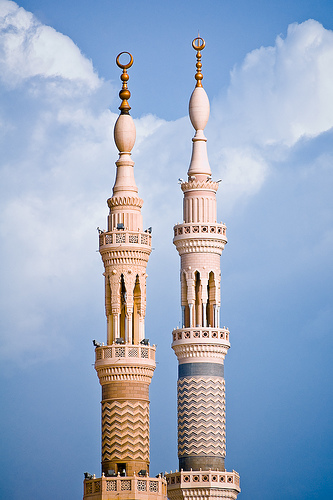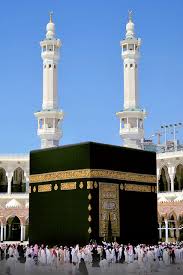The Legacy of Prophet Muhammad And the Issues of Pedophilia and Polygamy
Dr. Muqtedar Khan
Muhammad as a Medium and Source of Divine Law
No religious leader has as much influence on his followers as does Muhammad (Peace be upon him) the last Prophet of Islam. Islam, according to the Quran is the natural religion whose message was brought to humanity through a series of revelations to a long list of Prophets, that starts with Adam and ends with Muhammad and includes Abraham, Noah, Moses, David, Solomon and Jesus (peace be upon them). Indeed, Islamic traditions maintain that God sent over 125,000 Prophets to all people everywhere. Muslims believe that their faith has two constitutive pillars and they are the revealed word of God and the traditions of the Prophets. And Muhammad as the final messenger of God enjoys preeminence when it comes to revelation – the Quran – and traditions. So much so that the words, deeds and silences (that which he saw and did not forbid) of Muhammad became an independent source of Islamic law. Muslims, as a part of religious observance, not only obey but also seek to emulate and imitate their Prophet in every aspect of life.
Thus Muhammad is the medium as well as a source of the divine law. Therefore it is natural that Muhammad’s dealings with women have become constitutive of women’s place and role in Islamic societies. In this essay, I will examine some of the most contentious aspects of the Prophet’s life with regards to women, and argue that the prophet of Islam is a victim of the discourses advanced by those who hold malice against Islam and those narrow minded and unenlightened Muslims whose faith is not tempered by reason. In this discussion I propose to examine two issues – polygamy and Prophet’s marriage with Ayesha who according to a very popular report was six when he married her and nine when the marriage was consummated.
Constructing Muhammad: The Politics of Historiography
An extraordinary aspect of Muhammad 's life is that he lived in the full light of history. There are detailed accounts of his life available to us. No comparable religious figure’s life and times have been so well recorded as Muhammad’s. Muslims over a millennium and a half have performed a rare miracle of revering Muhammad in very profound ways yet jealously preserving his humanity by not falling into the trap of deifying him as God. Yet in spite of all the historical accounts about Muhammad’s life that are available to us, we must remember that the Muhammad we know is always the Muhammad we chose to remember. In fact, he is the Muhammad we choose to remember from the historical accounts we read of what his earliest historians chose to remember and report. One of the most striking examples of the different Muhammads that Muslims remember is the difference in prayer rituals of Muslims. Though minor there are several different procedures in which Muslims offer the Muslim prayer and the difference is essentially attributed to what those who prayed with Muhammad remembered. It is possible that Muhammad performed rituals differently at different times, or people remember these rituals differently. The point that I am making is that even in this continuously emulated/imitated aspect of life Muslims remember the Prophet’s precedence differently. This is important because Muslims pray in congregation five times a day and have been doing so for over 1400 years and nearly 20 of them with the blessed Prophet himself. This is a living tradition of the Prophet that was never discontinued even for a day in over 1400 years yet there are differing accounts of this practice. In that sense, who Muhammad is, is really the Muhammad we remember and not necessarily who he was. Because his life is a source of law, the writing of his life becomes a legislative process in itself. What we remember determines what laws we have and how we govern. It is therefore natural that the historiography of Muhammad’s life should become the site for the construction of intense political narratives. When remembering Muhammad the stakes are much higher than just historical accuracy. How Muhammad is remembered determines how Muslims organize society, what is permissible and what is not, and what roles and rights are assigned to women and what is privileges withheld. Today, Muhammad is remembered by two kinds of peoples, those who hate him and Islam and those who revere him and believe in his divine message. The Bigotry of Evangelical Christians In the after math of September 11th, Islam, Muhammad and everything Muslim has come under close scrutiny in the America that seeks to blame Islam rather than American Foreign Policy for that horrible tragedy. It seems that a section of American society – evangelical Christians -- are determined to label Islam as an evil religion and Muhammad as Prophet of violence for the actions of 19 Muslims. It is like blaming Jesus and Christianity for what Hitler did to Jews (holocaust), or what Queen Isabelle did to Muslims and Jews (inquisition), or for what Americans did to African Americans (slavery and racism).
Since September 11th Evangelical Christian leaders have called the Prophet of Islam a Terrorist (Rev. Jerry Falwell) and a "demon possessed pedophile who had twelve wives" (Rev. Jerry Vine). In these and similar attacks Christian Evangelists are seeking to stem the tide of conversions to Islam. By demonizing Muhammad as a pedophile and a polygamist they hope to generate enough distaste for Islam that it becomes difficult for more open and tolerant Americans to be accepting of Muslims and Islam. They also hope that they can reverse the growth of Islam in America. According to many scholars, Islam is the fastest growing religion in America attracting thousands of converts from all segments of American society, who usually were Christians before they chose Islam. While the traffic from Christianity to Islam is very heavy, the reverse flow, much to the frustration of the evangelists, is barely a trickle. This tirade of hate from the evangelists is merely the continuation of a very old Christian preoccupation with the demonization of Muhammad.
Christian thinkers have always abused the Prophet of Islam a famous example is Dante, who in his Inferno, considered by many as perhaps the pinnacle of literature in medieval Europe and quite certainly one of the most influential literary works of Western Civilization, throws him in the bowels of hell. The earliest Christian thinker to launch polemics against Muhammad was a ninth century activist, Eulogius of Cordoba who in a book titled Liber Apologeticus Martyrum, includes a polemic against Muhammad. Other Christians who have abused the Prophet include Peter the venerable (Of Cluny) and Alexader Du Pont.
It is interesting to contrast Christian writings from that of the enlightenment scholars. Leibniz in Theodize (1710) praised Muhammad for preaching a natural religion (Islam describes itself as Din-al-fitrah or the natural religion). Voltaire in 1756 published Essai sur les Moerurs, which includes a chapter on Muhammad titled "de l’Arabie et de Mahomet," in which he describes him as a wise man, an accomplished poet, a brilliant general, and a remarkable visionary. It is not difficult to see why the latter scholars are called as enlightened thinkers.
While most Christian thinkers have recognized the greatness of Muhammad, many others have demonized him, as do contemporary evangelists. Often the point of departure is his practice of polygamy, which is equated, with the reduced status of women in Islam. Needless to say Muslims disagree and vehemently oppose such conjectures.
How Muslims abuse Muhammad
Muslims take everything that the Prophet did as divinely inspired and seek to imitate him. But this tradition of child-women marrying older-men has never become a common practice in Islamic societies. There seems to be a silent and unstated consensus among Muslims, not to practice this Sunna of the Prophet. Without any overt discussion, Muslims seem to have rejected this tradition enmasse. Is this so because Muslims think that old men marrying young children is wrong? Then what happens to the claim that every act of the Prophet was divinely inspired and is worthy of emulation? Why don’t we emulate him and give our young middle school daughters in marriages to men getting ready for retirement? The answer to this question lies in the decline of critical approaches in Islamic studies.
The biggest disservice that Muslims do to Islam and Muhammad is through their uncritical approach to Islamic sources. Islamic religious sciences, which languish in the middle ages, confuse memorization with understanding and literalism with faith. This posture towards religious sources has led them to allow false narratives and often-bizarre interpretations to become cardinal elements of belief.
The general treatment of polygamy and the instance of Muhammad’s marriage to Ayesha are egregious examples of this condition. Why blame Jerry Vine for calling the Prophet as a pedophile when Muslims themselves have been saying this and believing it for hundreds of years. The books of hadith say this clearly. There is never any critical discussion of this issue. If it is false than it must be deleted form the books of faith and if it is true then Muslims must advance an explanation of this and accept that it can be a legitimate source of concern. According to Islamic sources there are many differing reports of how old Ayesha was when the Prophet married her. T. O. Shanavas in an excellent article ("Was Ayesha A Six-year-old Bride," The Minaret (March, 1999), shows from Islamic sources that Ayesha could have been anywhere between 14-21 when she married Muhammad.
It is time Muslims revisited their sources with a critical perspective and discarded what is false, improbable and inconsistent with the values of mercy, tolerance and justice, which are constitutive to the Islamic creed. Of Polygamy and Pedophilia As a believing and thinking Muslim, I am outraged by both, non-Muslims who make mean spirited comments about my faith and the Prophet I love and admire, and by Muslims who have allowed their narrow minded view of knowledge to corrupt a great religion and bring shame to its Prophet. By adhering to irrational, anachronistic and often meaningless traditions they obscure the power and beauty of Islam and deprive themselves and the rest of the world from its message.
Muhammad did not practice polygamy because he was unable to resist his sexual desires. At the age of 25 he married a women, Khadija, who was 40 years old and his boss. She owned a trading firm that Muhammad use to work for. Marrying an older women who was economically independent, richer and more powerful than him, are not the ways of a narrow-minded male chauvinist. Muhammad was a man of great honor and was widely respected. He could have married whoever he wanted and as many as he wanted since at that time men having many wives was common and often seen as a measure of a man’s status. In his marriage that lasted nearly 25 years, fifteen before his Prophethood and ten afterwards, he remained in a devoted monogamous relationship. I believe that this period of twenty-five years is a measure of Muhammad and his commitment to monogamy. If he did not succumb to his alleged libido in his youth and when society had no problems with that practice he still chose to be the anomaly in his times – a monogamous man. His other marriages in his days as the political leader of Medina must be seen more in the light of his politics than his family life. They were alliances with tribes, they were institutions of social welfare for destitute women and often responses to the contingencies of his time. If Muslims chose to ignore 25 years of Prophet’s monogamy and chose 12 years of his polygamy as a benchmark for Islamic principles and values, then this is a sad commentary on Muslims and not on the Prophet of Islam. If Muslims chose to forget the 25 years and remember only the last 12 years then yes Muhammad was a polygamist. After all Muhammad is what we remember of him. As far as pedophilia is concerned there is no doubt in my mind that the report that Ayesha was six, when Muhammad married her was false. It does not matter what her age was. Muslims must come out of their simplistic understanding of Islamic sources and take a more enlightened view of the role their religion can play in their lives. My advise is to hold firmly to the essential principles of Islam – justice, equality, fairness, mercy and compassion – and use these as beacons to guide the interpretation of specific texts and historical episodes while remembering Muhammad and while constructing Islam.
The reason why issues such as Muhammad’s relationship with women get so much undue and unfair attention is because the condition of women in Muslim societies is indeed deplorable. Their access to education and the public sphere remains unequal to the access men enjoy. Their share of the familial and societal resources is far less than that used by men. Regardless of how Muhammad related with women, Muslims must realize that if they wish to develop more egalitarian, more progressive and just societies, they cannot allow one half of their community to languish while the other thrives. Muhammad would not allow it.
-------------------------------------------------------------
PS. It is out of deep love and respect for Prophet Muhammad (pbuh) that I have approached this very difficult issue. I do not even claim that my words can do justice to his legacy, but I could not stand by as his name was being so publicly abused by so many. I also waited for nearly three months to respond to the allegations made by the detractors of Prophet Muhammad to see what response traditional scholars would make. It is their silence that compels me to fill the vacuum. Wallahu Alam.
***************************************************************************************************************************************************************************
Dr. Muqtedar Khan is Assistant Professor in the department of Political Science and International Relations at the University of Delaware. He is also a Nonresident Senior Fellow at the Brookings Institution. He earned his Ph.D. in International Relations, Political Philosophy, and Islamic Political Thought, from Georgetown University in May 2000. Dr. Khan is also associated with the Center for the Study of Islam and Democracy and the Institute for Social Policy and Understanding. He is the author of American Muslims: Bridging Faith and Freedom (Amana, 2002), Jihad for Jerusalem: Identity and Strategy in International Relations (Praeger, 2004). His forthcoming book is titled Beyond Jihad and Crusade: Rethinking US Policy in the Muslim World (Brookings Institution, 2004). Dr. Khan frequently comments on BBC, CNN, FOX and VOA TV, NPR and other radio networks. His political commentaries appear regularly in newspapers in over 20 countries. He has also lectured in North America, East Asia, Middle East and Europe. Dr. Khan's column has appeared in The New York Times, The Washington Post, The Wall Street Journal, Newsweek (Arabic), New York Post, Newsday, Arizona Tribune, Duluth News Tribune, The Daily Telegraph (London), The Sun (UK), Jakarta Post, Jordan Times, Manila Times, Outlook India, Palestine Times, Calgary Herald, The Daily Telegram (MI), San Francisco Chronicle, Detroit Free Press, Detroit News, Al Ahram (Egypt), Dawn (Pakistan), Daily Times (Pakistan), Hindustan Times (India), Washington Report on Middle East Affairs, Muslim Democrat, The Christian Century, Islamic Horizons, The Message, The Globalist.com, Arab News (Saudi Arabia) Progressive.org, fpif.org, Beliefnet.com, Arabies Trends, Al-Mustaqbal, Saudi Gazette, and many other periodicals world wide.



